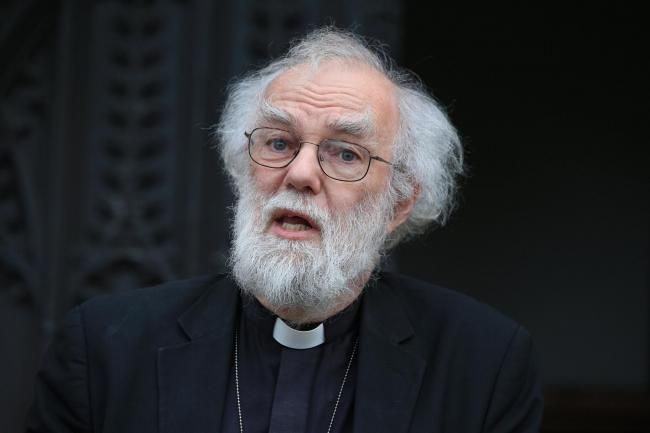He conducted one of the highest profile weddings of all-time. He worked with the Queen, politicians and religious leaders from around the world. He was the 104th Archbishop of Canterbury.
However, at the end of last term the Rt Rev Dr Rowan Williams trumped all these achievements and came back to Bristol, the place where he once lectured and in his own flattering words, a “very distinguished university”.
Before delivering a talk in the Great Hall of Wills Memorial Building, he took the time to speak to Epigram on all things international, student and personal.
Softly spoken, meticulous and fluent, Williams came across as a man of quiet grace and human dignity.
On refugees:
“I think there’s probably more we can do in this country, when I think of the proportion of refugees in some other countries who are not necessarily so well placed...“The crisis in the region is so colossal, there is no short simple answer. Sending people back to chaos and probably death doesn’t seem a reasonable solution.
“We have to work harder at it, as a country, as a continent.
“Given the risk and the expense, I don’t think people take the decision lightly to migrate.”
On Trump: the Christian…
When Epigram asked about the Pope's recent comments on Donald Trump's Christianity, Williams said “I wanted to stand and cheer!“Donald Trump’s Christian credentials do seem to be a little bit — slender. He’s apparently said that he has never had to ask forgiveness of God for anything which is, if true, enviable...
“I’ve no idea what his personal convictions are, I think the Pope was saying somebody who makes that kind of slogan a plank in their campaign has got some very difficult questions to answer from the Christian point of view. That's fine by me.”
...and the politician
“He’s campaigning on ‘dog-whistles’, that is on crowd-pleasing slogans. I can’t see that any of this will happen if by some extraordinary chance he becomes president."I think it is a really critical situation for American politics."“But at the moment it just feeds into a narrative of panic, — paranoia and, as we’ve seen in the last few days, a sort of violence found below the surface...
“He’s taken seriously by lots of people. He’s not funny, as it were!
“What worries me is how a huge complex society like the United States copes with the fact that a large proportion of their population are seriously alienated from the mainstream political process. Whether it is people looking to Bernie Sanders or people looking to Donald Trump.
"What [also worries me is what] the main stream parties and institutions do about it, because I think it is a really critical situation for American politics."
On 'poisonous' anti-Semitism in University campuses…
“I’ve got a reasonable record of being critical of the government of Israel in many respects...“But some people will unfortunately use the difficulties with Israel’s behaviour as an excuse for unleashing what does seem to me, completely indefensible, straightforward, anti-Semitic, bilious, hateful stuff.
“People who say ‘Hitler had a point’, well, they haven’t got a point.
“I think the policy of minimal tolerance of this in university circles is essential.
“We’ve been there, we know what anti-semitism is. It is a reality… There are Jewish students who are feeling really intimidated because of cyber bullying, you know, chronic bullying. It’s a fact and a very uncomfortable one but it needs facing.”
“The fact that there’s horrendous suffering and cost imposed on one community isn’t a reason for demonising the other community as a whole"
…and the Boycott Israel Campaign
"I’m not myself in favour of wholesale BDS [Boycott, Divestment and Sanctions] agenda, for a number of reasons. I, as Chair of Christian Aid, would say that I’m keen that we should have labelling of goods from Western territories, that settlement produce should be identified...“The fact that there’s horrendous suffering and cost imposed on one community isn’t a reason for demonising the other community as a whole, or going back to the whole pattern of thinking of collective Jewish guilt in the way that Christians have often done over the centuries.”
On the Prevent Strategy and Safe Spaces
"There’s a balance between the reasonable protection of students from real offence … and student bodies infantilising one another [saying] ‘Oh no, you’re too delicate to cope with this.'"So I think we just need to listen very hard to the specifics here, and always ask the question, ‘Are we … muffling a real exchange of legitimate opinion? Or are we rightly identifying views that are not only unacceptable but damagingly unacceptable?
"It's not easy but I think the Prevent Strategy risks overkill, it gives to universities the task of policing conversations and discussions which I think universities should have. They exist in a sense to have un-policed discussions — that’s the whole point of higher education I think...
"I do worry about it."
On the Royal Wedding
“The one thing I’ll be remembered for!“I’ve said to people before, I’ve done weddings, this was a very big one. I thoroughly enjoyed it.
“When you’re actually there, doing it, you’re not conscious of the millions of people watching, you just get on with it.
No nerves?!
"Well I guess there might have been a few quivers."
On final years about to leave university and enter the real world
“There’s no such thing as the real world! The world is as real as you make it wherever you are.
"Graduates? I think, the one piece of advice I want to say is, you’ve been taught to ask questions. Don’t stop."
And for those who missed his main presentation…
His address on Theology and Meditation was complex, focussing on "one particularly interesting period in the history of early Christian writing and thought from roughly 500-700 AD."However, from it he offered a number of important and relatable messages.
He argued that there are “ways of talking about God that are not only stupid but actually quite damaging.”
Theology is, in his eyes, can be defined as a “search for the least stupid things you can say about God.”
He spoke plainly of our “imperfect and conflict ridden world” and how “we see the wreckage we make of our environment, we see the wreckage we make of our relationships – individually and internationally.”
He argued that we “shouldn’t treat the world as a child in a sweet shop” but should strive to “see our world not just in terms of our own egos and our wants but in terms of what is actually there.”
His concluding point was "that when the skies are dark and the weather looks unpromising ... we look east in winter even though sunrise seems to be very slow and very late but we do know where it comes ... [we can] look east in winter and find some hope there."
There was also a response from the University's Rupert Gethin, a scholar and practitioner of Buddhist meditation. A number of interesting similarities were drawn between the religions.
As our host for the evening, Professor Gavin D’Costa, said, the former Archbishop’s new title of Lord Williams of Oystermouth, is fitting for a man with such pearls of wisdom.
He is not wrong. Williams carried an inspiring presence. We thank him for his words and time.
Featured image: Swindon Advertiser
What are your thoughts on some of these issues? Get in touch via social media or in the comments below.
Facebook // Epigram Features // Twitter
Epigram would also like to thank the Department of Religion and Theology and the Public and Ceremonial Events Office for organising the event and giving us the chance to speak to Williams.








